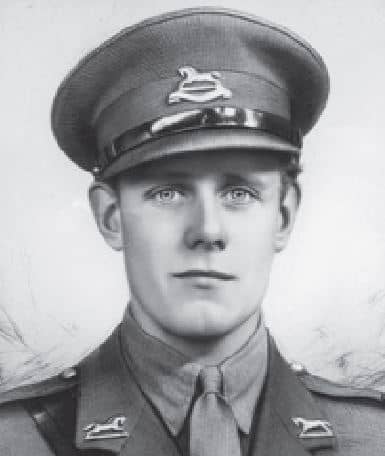Tony Branfoot grew up in happy family life at Stonegrave in North Yorkshire and after school at Bradfield became a stockbroker. He joined ‘A’ Squadron, 3rd Hussars at Tidworth at the outbreak of war, having been in the Supplementary Reserve since 1938.

A keen and very competent all-around sportsman, who was a county tennis player, he more than held his place in the Regimental football team; an unusual achievement for an officer, especially as it included two or three ex-professionals.
When the Regiment moved to Yorkshire he whipped into the beagles and he and his family were generous hosts in the Sinnington Vale country a contemporary remembers him as strong, brave and popular with all ranks.
In the first campaign in the desert, he survived a direct hit on his tank and in January 1942 he went with ‘B’ Squadron to the Far East from Cyprus. They were destined for Singapore, which fell before they arrived, so were diverted to Sumatra and then Java.
By the beginning of March, the Japanese had six divisions on the island faced by a ramshackle American, British, Dutch, and Australian Command, which had neither sea nor air support.
The 3rd Hussars, some American artillery and three Australian pioneer battalions attempted to hold up the enemy, but on 8 March the Dutch East Indies Government agreed on a surrender.
‘B’ Squadron, who had acted as an effective rearguard to the Allied retreat, destroyed their remaining tanks and made their way on foot to the south of the island in the hope of escaping by sea. But all boats had been destroyed and there was no option but to become prisoners of war.
For the next three and half years, they were to suffer starvation, disease, unremitting toil and brutal punishment. After a year in Java 81 of the squadron were sent to Ambon, a five-day voyage battened down below decks in the tropical heat. There they were set to work constructing an airfield, working 12 hours a day.
Throughout their captivity Tony stood up to the Japanese for his men, frequently taking punishment on their behalf. The senior British officer at Ambon, in charge of 1,000 men wrote ‘Complete demoralisation and loss of all discipline in my Command might have resulted had not the men of ‘B’ Squadron 3rd Hussars under Lt Branfoot come forward and taken the lead.’
Tony’s determination, bravery, leadership and steadfastness were exemplary and undoubtedly saved many lives.
Due to their morale and discipline, the Squadron had only 50 per cent casualties. Their motto was ‘The Japanese will never get us down.’ For his services in captivity, he was recommended for the DSO, but the War Office policy was only to award the various grades for the British Empire decoration for services while a prisoner of war.
When Tony was returned to England in December 1945 he weighed six stones and his recovery in hospital was slow.
However, he got on with his life; he married June Lindsell in 1949 and started a new career as a prep school master at Horris Hill but as a result of his captivity developed TB in several forms.
Recovery took several years much of the time in hospital, but in 1953 he was able to take up a post as a part-time teacher at Hordle House School at Lymington On Sea.
Over the next 32 years, he progressed to full-time and eventually to the assistant headmaster. He was a brilliant schoolmaster, teaching Latin and French. His success is best judged by tributes from former pupils who speak of him as ‘fantastic, respected and popular’, ‘always fair and always fun’. He had a great gift of communicating and an ever-present sense of humour.


